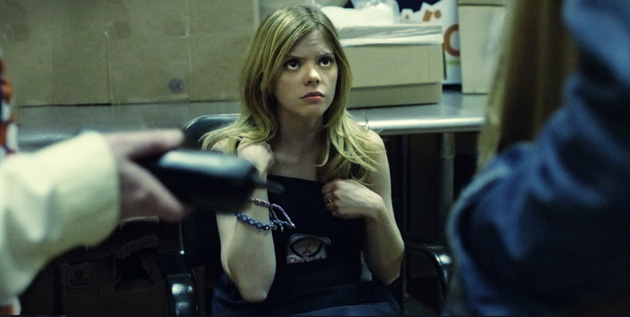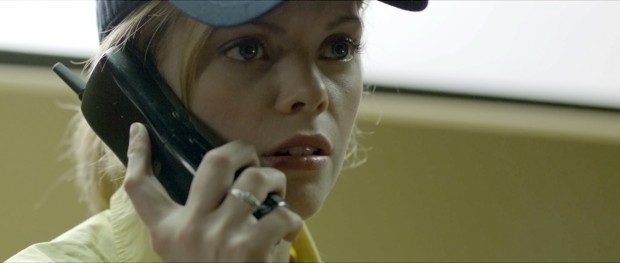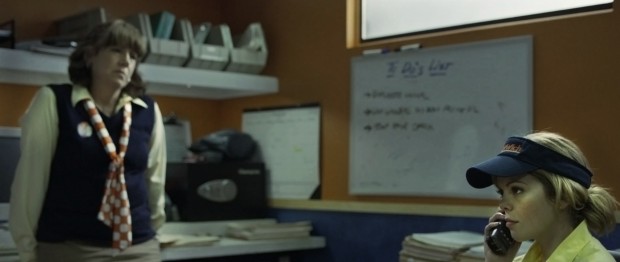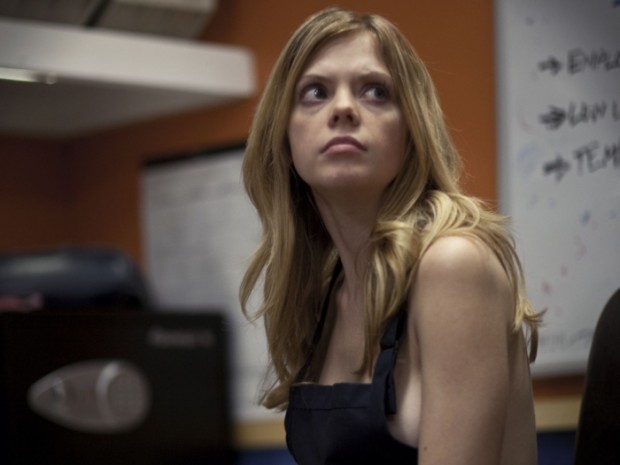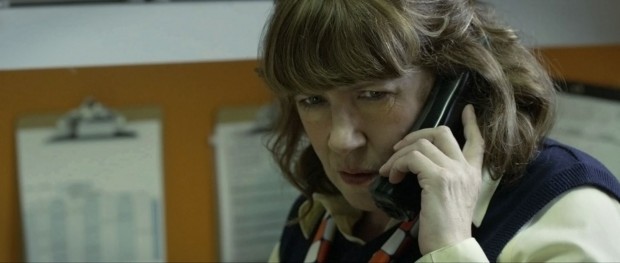Craig Zobel was here at Sundance a few years back with Great World of Sound, a comedy about an aspiring record producer and his strange breed of client. This year he returned with a film that’s far less funny but a bit more thought-provoking. Compliance asks those watching, ‘what would you do in this situation?’ The situation is something harrowing and disturbingly close to home.
TFS talked to Zobel about how one makes a movie like this, getting the money to do so and how hard it is to shoot the equivalent of a 45-minute sex scene. There’s also his friendship with David Gordon Green (who executive produced the film) and the realization that he made an entire movie about one sentence in The Girl With The Dragon Tattoo.
The Film Stage: Let’s talk about the evolution of this film. Why was it the right time? What exactly did you read? And how did you get funding for something so hard to watch and film, for that matter?
Craig Zobel: I was finishing writing another script. A draft of a script that I’m really passionate about that I’m sure will happen at some point. It’s based on a true story, again. And this one’s based on this Wired magazine article. It’s bigger than that. It’s called Gizmondo’s Spectacular Crack-up. It’s all about these Swedish con-men.
It’s super cool. I was finishing a draft of that and had been considering this for a while. It just was a story. I hadn’t really put pen to paper at all. I had initially rundown the idea with my friend David [Gordon] Green, the director, and he was like, ‘That’s fucking amazing. You should do that.’ But I wasn’t quite sure I knew how. It scared me to do it, on a level.
With Compliance?
Yeah. It was a weird movie, you know? So I was finished with the other thing. It was clear that this [comedy] project I had been attached to at Fox wasn’t going to go anywhere. So it was more than ‘I want to make a movie.’ It was more than that. I don’t want to make a little indie romantic comedy where people learn about their feelings and stuff.
So I wasn’t just trying to go make any old movie. But it was like, ‘If you made something like that, at least I would be making something with a high [probability] of failure.’ And that scared me. It was also intriguing to put myself in a place where I was like, ‘Well, are you good enough?’
[Laughs]
So I was like, ‘If I’m scared enough I should do it.’ I wrote the script in like a month. Really fast. After the script, the first few people I showed it to were like, ‘Yea, we think we can get you some money for this.’ If I had waited around and tried to land a big actor, I think I could have gotten more money than I got. But I think at some point it was a safe bet in the sense that it was ripped from the headlines enough to be appealing.
To make people feel like the worst version of this is still something that maybe someone will buy just to have that. Safer than that 20-something white people having problems movie. It felt a little safer to investors than that simply because the concept was higher. So we got the money relatively quickly. I was done writing it in the beginning of October.
October, 2010?
Exactly. And then we were casting it in January of 2011. Then we shot it at the end of February, beginning of March.
That’s a great turnaround.
Yeah, it was awesome compared to all these other projects that when I signed on they’re like…
It just languishes?
Yeah.
What did you shoot it on?
I shot it on the Arri D-21. Which is like the old version of the Alexa.
It looked nice. I thought it was the Alexa when I was watching it.
It’s the same stuff. The only difference is you have to carry this big box around. [Laughs] This umbilical cord to the camera. But yea, I would have shot this on a 5D if we needed to. We had the resources to do that. But it looks good enough.
Was [the budget] under a million?
Yes.
That’s great. That’s amazing. It looks like you were saying: some of these bigger five-million dollar movies of like four friends in L.A. just trying to figure it out.
[Laughs]
How much research ended up going into this? Where did it all come from?
I was reading a book about the Milgram experiment. And I was just fascinated by that. The thing about the Milgram experiment was that it was fascinating enough that I started looking around for more stuff about it and somewhere it was like, ‘Do you want to see a real example of the Milgram experiment?’ Actually, I think it was a documentary on behavior experiments that was made for TV, and when they talk about the Milgram experiment, they lead from that into this story. And it was just a little part of it. And I was like, ‘Wow.’ I started reading all about that and all the newspaper reports on it, and then eventually was able to get court records of the opinions of the case against McDonald’s. They were like the most free to share. But yes, I read like court stuff as much as I could. Which is so weird because that’s like processed through year’s of court cases.
And this script is like a melding of a couple of things?
A couple of things, yea. Mostly it’s one and the significant things to note are from one story. It really was a woman manager and there really was a blowjob and there really was jumping jacks and there really was a fiance who came and all of that stuff is like… but I would only know the stuff before they called the boyfriends they took another employee in back and he said that he didn’t want to be back there and left. And that’s all I’d know. So I’d be like, ‘What the hell was happening there?’ Because why didn’t that guy stop it? So it’s like, that guy’s a character. I want to write about that. Because that’s fascinating. Why didn’t he…
It’s not necessarily the Kevin character but it’s like he’s not a bad guy but he’s a kid…
He’s just like, ‘I don’t want to… don’t blame me.’
OK. So, this is, in many ways, like you’re almost directing a 90-minute sex scene.
[Laughs]
Right? Because with sex scenes you have a closed set…
Oh, yeah!
So how do you do that for an entire shoot?
Yeah. Man, it was crazy. For two weeks we were like in that room, doing that part of the movie. And it was intense.
What do you say to your actors? Like to get them ready?
Oh, well, before hiring them there was a discussion before. You’ve read the script. You know what we’re doing. It’s funny because some people ask me, ‘Well, are you making the actors comply?’ And I’m like, ‘No, they chose to participate.’ You know? A lot of people passed on it. The people that wanted to do this were fascinated by the same subject. Which isn’t the question you asked…
Oh, no no. It’s fine.
But, we were pretty explicit. Dreama [Walker] and I had a lot of conversations about what all the shots were going to be. And I don’t know. I had never done…When I said things that scare me, I had never done a sex scene before. And this wasn’t even a sex scene where people would be happy having sex.You know? [Laughs]
This was like, double hard. Because it was in that one location.The first day there was a ton of crew, but to a degree too many people could not be on set. Because it was only one room. It’s funny that everybody was cracking jokes whenever we weren’t heavily into a take.
I guess you have to.
Well, that just bubbled upwards, but yea. That’s funny.
There’s a lot of repetition in convincing the characters and convincing the audience that this is all plausible, and even true in some ways. And then you get to the scene (SPOILERS AHEAD) [with the spanking and the ultimate blow job], and it seems to me that it kind of doesn’t dive into it as much. When I was watching it I almost wanted to know how he goes from asking her to take off her apron to rape. Was there ever more of an explanation in earlier drafts?
There was an earlier draft. I actually cut out another sex act that happens. Basically this was a combination of intention and what we had at the end of editing. It just made sense and worked. Dreama, Ann [Dowd], and I were both tracking different things. So I would do almost two takes of everything. I would do, say, the take for Ann where Ann’s really mean to Dreama and jealous, and then the take where she’s like a mom. And we would do that every big scene. Because we were kind of trying to figure it out. At what point did it change, you know? We moved really fast with Ann but with Dreama it was a bit harder so some of what’s there I had something I thought was really in the wrong direction, that went a little further in the explanation, but you wouldn’t have liked that scene. I felt like this was kind of the end of what we could do.
It almost seems like in the movie what’s implied is that, once she bends over, he’s no longer himself.
His decision…Bill would not want to explain that to you and so I’ll try to be respectful of that to a degree. But I think Bill saw Van as, in some ways, having this crazy complicated relationship with his girlfriend, that was in some ways motherly. He’s always asking her permission to do stuff. And he kind of blames it on her. He’s almost doing it to get back at her. If you think about it, that character is actually super hard. The writing of Van is much more blunt and stupid. I couldn’t find a lot of sympathy for that character, and Bill taught me to find the sympathy in that character, because he is just amazing. One of the best actors I’ve ever worked with. He found a way to make [that sequence] such a rich part [of the film] when I would say the script is much more judgmental towards him.
There’s an amazing shot I noticed when I watched it. I didn’t watch the screening today but I watched it yesterday-
 Do you have trouble watching it with an audience?
Do you have trouble watching it with an audience?
Yeah.
Do you sit in the back? How do you watch it?
Yea I sit in the back but it’s hard for me. It’s weird, which I didn’t…I mean it’s been another learning experience. It definitely makes me wonder what I’m going to do next. [Laughs]
What’s your response to this criticism that what you’ve made is exploitative in some ways?
I think that it’s hard. Like I said, I will freely stand up and admit that it’s hard to watch too. I just feel like it’s reductive to say that it’s just exploitation of a girl. What is it exploitation of? Can you be more specific of your criticism?
I understand that it’s a hard movie to watch and I understand that it may turn some people off. Exploitation is seeing a girl nude in a movie so you can sell more tickets. Like some stupid sex scene that didn’t need to be in the movie. Like at the very beginning. I mean we can talk about it. Exploitation in movies? Are you kidding me? That’s an easy conversation to have. I thought about all of the nude shots that I put in this movie because I knew I had a responsibility.
Exploitation has to do with an intent, in some way right? There will always be people who just cannot eat these kind of vegetables. They just don’t like this kind of movie. And they will find a reason to not like and they will use a word that comes to mind quick.
Well it’s close to home. While watching I was thinking about my own experiences. Real cops psych you out, that’s part of the job. And before you know it you’re saying ‘I’ll do whatever you want, just don’t call my mom!’
Exactly. I mean we give our authority to people, right?
Have you seen The Girl With The Dragon Tattoo?
Yeah.
One of the most beautiful pieces of writing in that movie is when Daniel Craig slips outside of Stellan Skarsgard’s house after he knows he’s the killer. And Skarsgard catches him and invites him in. And he goes in! Then Skarsgard says, ‘You knew it was me but you came in anyway…because you didn’t want to be rude.’
That gives me goosebumps because I thought so much about my movie while watching that scene! That blew me away. I was like, ‘I made a movie about that!’
Yes!
[Laughs] It’s a movie about that line. That’s perfect.
So what is next. These scripts that have bee floating around? Or something new?
The Fox thing is in a bit of a hibernation…
Can you convince David Gordon Green to make movies like Snow Angels again?
I texted David this morning. Don’t worry, he’s got some awesome sh*t coming up.
Let’s get back to you.
I have a story, a straight thriller I developed with him. Like a horror-ish thriller genre thing, which has been real fun to write. Because I had a lot of fun on Compliance in that I realized, ‘Oh, I can do this tension thing.’ I kind of discovered that on this movie and decided, ‘I should do one that’s normal.’ So I’d like to do that, I also have an idea that’s been in my brain for a long time that’s half-written. I’d love to direct someone else’s work. It takes me a while to write usually. I’d be excited if I see something I like from someone else.

